Studying for her master’s degree in public health, Alison Granger was interested in a course at the University of Michigan that would let her take the lessons from her textbooks and classroom lectures and put it into practice.
That’s why she enrolled in BA685: Healthcare Delivery in Emerging Markets, a course offered at the Ross School of Business.
“I was interested in getting a more in-the-field, global perspective on what I’ve learned so far in class,” said Granger, who traveled to Ethiopia for her project. “And I did with this class.”
The class is comprised mostly of MBA2 students, but also is open others pursuing other graduate degrees such as Granger. It’s designed to enhance participants’ international leadership capabilities, increase awareness of diverse business issues within the current global landscape, provide on-the-ground experience in a foreign country and contribute to the success of partner health clinics and hospitals. It is taught by WDI President Paul Clyde.
The course, organized and primarily funded by WDI with some financial support from Michigan Ross, responds to the increasing need for managers with international business perspectives to augment their business and management knowledge. During the first part of the term, students learned about healthcare in emerging markets through lectures, guest speakers and case discussions. Students were then divided into five teams and prepared for visits to their selected country, traveling to those destinations in late February and early March.
This year, student teams worked in Ethiopia, India, Kenya, Peru and Rwanda. All five teams presented recaps of their projects on April 22 at Michigan Ross.
Clyde said the travel-study course lets students combine what they learned in the classroom with hands-on experience in the field. It features a collaborative learning environment with faculty and students learning from each other in an action-based learning setting.
“Through this course teams of students from Ross, SPH and School of Information have provided our partner healthcare organizations value through analysis of their operations, customers and strategy,” Clyde said. “Through this experience, the students gain unusual insights into the opportunities and challenges of operating healthcare organizations in LMICs.”
Here is a recap of the BA685 projects:
More than 1 million infants die each year due to severe respiratory distress, with 99 percent of these deaths in low- to middle-income countries, according to the World Health Organization. Current noninvasive ventilators are expensive, require skilled operators, and fail during power outages that are common in emerging markets. AIM Tech developed NeoVent, a low-cost, low-tech, easy-to-use ventilator that is non-electric and has only one moving part. It also can be manufactured at scale for less than 1 percent the cost of conventional ventilators.
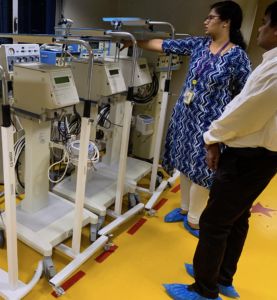 AIM Tech wanted the BA685 student team to evaluate if AIM Tech should enter the Indian market and provide recommendations for a market entry strategy. The students visited Delhi,
AIM Tech wanted the BA685 student team to evaluate if AIM Tech should enter the Indian market and provide recommendations for a market entry strategy. The students visited Delhi,
Mumbai and Chennai, and interviewed and provided product demonstrations to 24 healthcare facilities, one government official, two manufacturers and one distributor. The students found that the Indian healthcare market shows a high-growth trajectory. The government’s focus on entrepreneurship, insurance, and neonatology also creates favorable climate and demand for NeoVent, while clinicians see the product as unique, necessary and value it at a higher-than-planned price, the students noted.
They recommended AIM Tech license NeoVent to a multinational corporation with an existing foothold in the Indian market. Another suggestion was to pilot NeoVent with a large hospital following FDA approval.
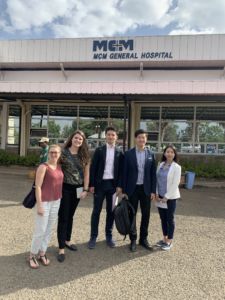 The lack of reliable, local liquid oxygen suppliers in Ethiopia for hospitals makes it necessary to have an oxygen separator system on the grounds for the hospital EADG is building. EADG asked the BA 685 students to study two questions: should EADG’s future hospital build and operate a medical gas plant?: and, should EADG sell excess medical gas to area hospitals?
The lack of reliable, local liquid oxygen suppliers in Ethiopia for hospitals makes it necessary to have an oxygen separator system on the grounds for the hospital EADG is building. EADG asked the BA 685 students to study two questions: should EADG’s future hospital build and operate a medical gas plant?: and, should EADG sell excess medical gas to area hospitals?
Based on research and interviews with hospitals with its own medical gas plants on-site, the students’ findings showed that EADG would benefit from building its own facility and could learn from other hospitals that have done the same. On the question of whether to sell excess medical gas, the students’ research showed it would not be a good decision to do so. It is not profitable, the research found, and there is robust competition and several barriers to entry in the market. The students encouraged EADG to begin the bidding process soon to select equipment suppliers because the hospital is expected to open in 2021. They also suggested EADG monitor the medical gas market for any movement or changes in government policy that might make it more profitable to sell excess medical gas.
Timely and accurate data reports are vital to operations at rural health clinics. Electronic records have been implemented, but poor staffing and internet connection have made e-records ineffective. The Ihangane Project, in partnership with nurses from rural health centers, created E-Heza Digital Health Record to deliver more timely and accurate data to the Rwanda Ministry of Health. The ministry has requested that E-Heza be expanded throughout Rwanda to serve maternal child care.
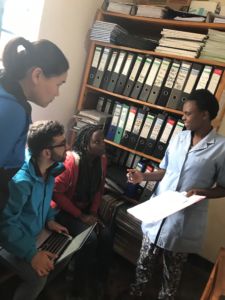 The BA 685 students project was to establish a framework for evaluating the efficiency of the current data reporting system and E-Heza in terms of timeliness, cost and data quality. To accomplish this, the students: analyzed the current lead time for data to move from point of care to the Ministry of Health; identified the cost of data reporting, including revenue loss; defined measurements to evaluate data accuracy; and developed framework to evaluate the efficiency of data reporting.
The BA 685 students project was to establish a framework for evaluating the efficiency of the current data reporting system and E-Heza in terms of timeliness, cost and data quality. To accomplish this, the students: analyzed the current lead time for data to move from point of care to the Ministry of Health; identified the cost of data reporting, including revenue loss; defined measurements to evaluate data accuracy; and developed framework to evaluate the efficiency of data reporting.
The students recommended a framework that evaluated efficiency in terms of timeliness, cost savings and data quality.
For next steps, the students recommended recording observational data for each process in the workflow, testing the framework for E-Heza and other health modules and exploring and quantifying the potential adverse effect due to poor data quality.
The Kisii Eye Care Institute started in 2013 and it has grown from an eye care service provider to a medical eye hospital and training center. It provides 3,000 surgeries annually but wants to increase the demand and capacity to 5,000 per year. Kisii operates as a social enterprise using an entrepreneurial approach to solve a social problem – avoidable blindness and visual impairment. Services are provided at normal rates for those who can afford them and substantially below cost to low-income members of their community.
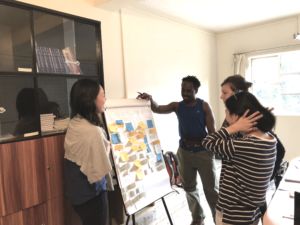 The BA685 student team put together a business plan for Kisii to increase demand for its services and improve operational efficiency. The students said surgery and optical services (glasses) are the largest revenue generators for Kisii and it must enhance its marketing strategy in both areas. Operationally, to decrease wait times and provide patients with a higher quality overall experience, current processes must be improved by standardizing the patient queue and improving counselor training, among other things. And to be ready for future growth, the current Kisii organizational structure must change, roles need to be redefined roles and responsibilities shifted.
The BA685 student team put together a business plan for Kisii to increase demand for its services and improve operational efficiency. The students said surgery and optical services (glasses) are the largest revenue generators for Kisii and it must enhance its marketing strategy in both areas. Operationally, to decrease wait times and provide patients with a higher quality overall experience, current processes must be improved by standardizing the patient queue and improving counselor training, among other things. And to be ready for future growth, the current Kisii organizational structure must change, roles need to be redefined roles and responsibilities shifted.
PAMS Policlinico wants to become a gastrointestinal (GI) center of excellence. It currently offers GI services and recently a GI doctor from the University of Michigan visited to develop an operational understanding.
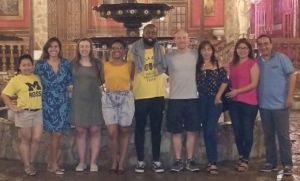 Last year’s BA685 team conducted a market analysis to determine how PAMS could grow to become a center of excellence in either GI or ophthalmology. This year’s student team built on that previous work and developed a complete business plan that: evaluated marketing strategy; studied GI equipment options to ensure there is an adequate plan for maintenance, repairs and acquisition; and, assessed opportunities to decouple skills and create a new position to take on some of the current physician duties. This business plan will be presented to potential PAMS funders this spring.
Last year’s BA685 team conducted a market analysis to determine how PAMS could grow to become a center of excellence in either GI or ophthalmology. This year’s student team built on that previous work and developed a complete business plan that: evaluated marketing strategy; studied GI equipment options to ensure there is an adequate plan for maintenance, repairs and acquisition; and, assessed opportunities to decouple skills and create a new position to take on some of the current physician duties. This business plan will be presented to potential PAMS funders this spring.
The students’ research and on-site observations and interviews showed: A lack of standardized practices lead to operational inefficiencies and lowered capacity even with sufficient personnel; contract incentives are not structured to achieve best outcome for PAMS; omission of certain accounting practice lowers visibility into financial health of PAMS and each specialties; and, the Polyclinic is one of the few providers of colonoscopies in the region.
The student team’s recommendations included: optimizing processes allowing for maximizing use of resources, including supplies and the time of healthcare providers; standardizing processes also decreases waste and allows more patients to be treated per week, ultimately increasing patient volume and with it, revenue.
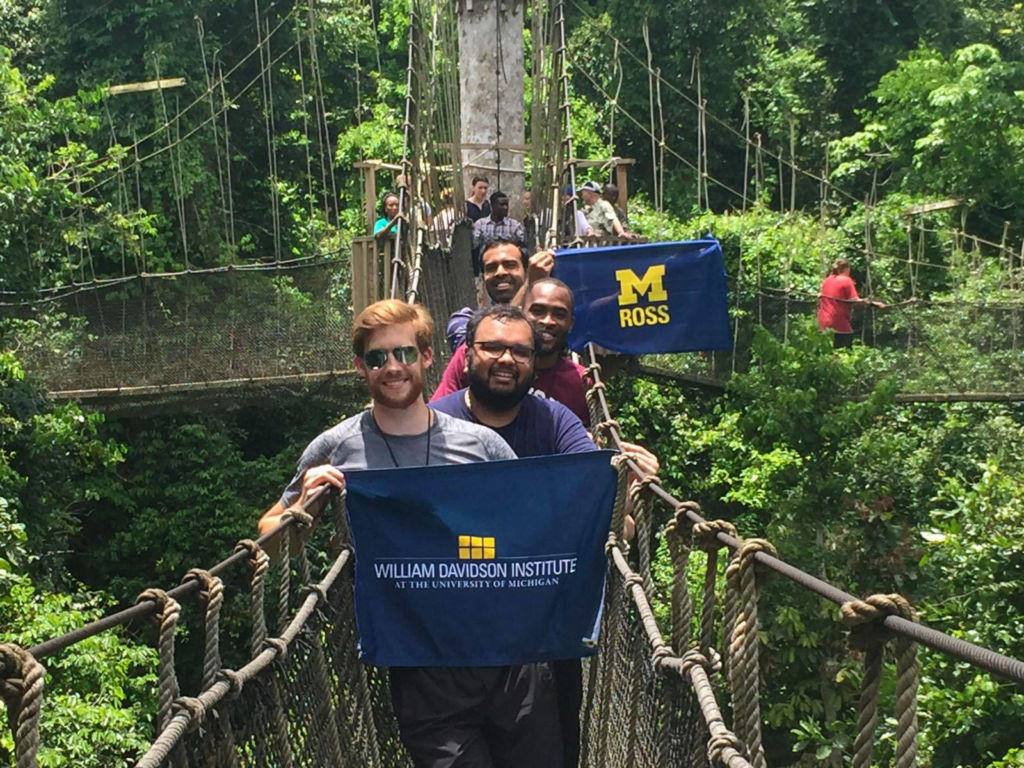
A 2018 WDI MAP team in Ghana.
Carrie Boyle, a MBA student at Michigan’s Ross School of Business, hopes to work in philanthropy somewhere in the U.S. after graduation. But for a couple of weeks in March, she is excited to be traveling to India as part of the school’s annual Multidisciplinary Action Projects (MAP).
“Working in another country is something I may never get the chance to do again,” she said. “This will be my first time in India and the country really interests me.”
Boyle and her teammates will work with Michigan Academy for the Development of Entrepreneurs (MADE), a nonprofit institute established at Ross by the Zell Lurie Institute for Entrepreneurial Studies, in partnership with WDI and Aparajitha Foundations. MADE works with entrepreneurship development organizations in India to help entrepreneurs operating small- and medium-sized enterprises (SMEs) succeed.
Boyle said she had some criteria when looking for MAPs that interested her.
“I wanted an opportunity to be on the ground having meaningful conversations with the people most immediately impacted by SMEs,” she said. “SMEs employ so many people and impact so many lives.”
Her teammate Shoko Wadano said she too is interested in working with SMEs, “which are very common in India.”
“I’m interested in how businesses mature in India,” she said. “I want to learn what pressures and impacts SMEs have in common, and what kind of value we can bring to them.”
WDI is sponsoring the MADE MAP project along with 10 others this year. MAP is an action-based learning course in which MBA students receive guidance from faculty advisors from WDI and Ross. Each project requires analytical rigor, critical thinking and teamwork. (Find out more about WDI’s MAP projects over the years here.)
After learning about their projects and conducting secondary research for several weeks, the student teams spend two to four weeks working with their organizations in the field.

David Butz
“The complementarities between the talents our students bring and what our sponsors need are sublime,” said David Butz, a WDI senior research fellow in the Healthcare sector who is an advisor on two projects. “Our students experience impact in brand new ways. Our sponsors learn, too, how disciplined management methods can yield dramatic innovations.”
Butz said he enjoys working with the student teams on MAP because it “poses such a unique challenge for both the students and their sponsor organizations, and forces us all to think big.”
“For me, the best achievements are tangible, direct and narrow but at the same time big and high-impact,” he said. “In our short time, can we help to break some key bottleneck, expedite a critical process pathway or otherwise liberate resources and expand capacity? Is the innovation scalable or replicable elsewhere? Do the students and organizations thereby feel empowered?”
Here is a summary of each WDI-sponsored MAP project:
Aravind Eye Care System – India
MAP Team: Rohan Dash, Sid Mahajan, Aman Rangan, Nik Royce
Aravind Eye Care System (AECS) is a vast network of hospitals, clinics, community outreach efforts, factories, and research and training institutes in south India that has treated more than 32 million patients and has performed 4 million surgeries since its 1976 founding.
AECS opened a tertiary eye care center in Chennai in September 2017 that will ultimately serve more patients than any other facility in the AECS system. The MAP team will formulate a detailed three-year strategic plan for Aravind Eye Hospital in Chennai.
CURE International, Inc. – Kenya, Ethiopia, Zambia, Uganda
MAP Team: Dominique James, Sarah Raney, Hannah Viertel, Olga Vilner Gor
CURE operates clubfoot clinics in 17 countries around the world, each tasked with helping children and families deal with the congenital deformity that twists the foot, making it difficult or impossible to walk.
For CURE, the student team will develop a strategic evaluation framework to assess opportunities for market entry and expansion building on global data.
Ghana Emergency Medicine Collaborative – Ghana
MAP Team: Benjamin Desmond, Benjamin Quam, Nicholas Springmann, Vishnu Suresh
The Ghana Emergency Medicine Collaborative aims to improve emergency medical care in Ghana through innovative and sustainable training programs for physician, nursing and medical students. The goal of the training programs is to increase the number of qualified emergency health care workers retained over time in areas where they are most needed.
The MBA team will formulate a detailed strategy to implement interoperable digital payment systems in Ghanian hospital emergency departments.
India Investment Fund – India
The India Investment Fund is working to become the first international, student-run fund at the Ross School of Business. Ross MBA students would be responsible for investing, managing and growing a real investment portfolio.
MAP Team: Charlie Manzoni, Patrick Riley, Queenie Shan, Sheetal Singh
The student team will conduct due diligence on Indian small- and medium-sized enterprises to assess viability for investments, and an appropriate financing instrument.
Infra Group – Ethiopia
MAP Team: Rin Chou, Chandler Greene, Yuki Ito, Brittany Minor
Infra Group is diversified international group with business units in financial services, industries and infrastructure development. Infra Group helps build a more prosperous society through global-scale business development with integrity as its top priority.
The MAP team will conduct due diligence on a group of small- and medium-sized enterprises (SMEs), and recommend which ones to invest in and what amount to invest.
Lviv Business School & Ukranian Catholic University – Ukraine
MAP Team: Blake Cao, Emily Fletcher, Kelsey Pace, Adam Sitts
Lviv Business School and Ukranian Catholic University is a private educational and research institution in western Ukraine.
The student team will undertake a needs assessment of the small- and medium-sized enterprises (SMEs) to determine if Lviv Business School should begin offering consulting services to these SMEs and if so, how those should be structured.
MADE – Poornatha/Aparajitha Foundations – India
MAP Team: Carrie Boyle, Lawrence Chen, Dillon Cory, Shoko Wadano
Michigan Academy for the Development of Entrepreneurs (MADE) is a nonprofit institute established at the Ross School of Business by the Zell Lurie Institute for Entrepreneurial Studies, in partnership with WDI and Aparajitha Foundations. MADE works with entrepreneurship development organizations in developing countries to give individuals operating businesses in these environments the knowledge and best practices they need to thrive.
The MAP team will develop an expansion plan for MADE in the southern Indian state of Tamil Nadu.
The Ihangane Project – Rwanda
MAP Team: Lauren Baum, Nadia Kapper, Paul Mancheski, Jason Yu
The Ihangane Project (TIP) empowers local communities to develop sustainable, effective, and patient-centered health care delivery systems that holistically respond to the needs of vulnerable populations. Partnering with Ruli District Hospital and its associated health centers, TIP is working to identify key strategies for improving health outcomes.
The student team will develop a business model to grow the ready-to-use therapeutic food that is used to treat severe, acute malnutrition.
WEEKEND MBA MAP PROJECTS
Awash Bank – Ethiopia
MAP Team: Matthew Campbell, Joshua Dodson, Joseph McCarty, Aman Suri
Awash Bank, a private, commercial bank, was established in 1995 and features more than 375 branches across the country.
The MAP team will develop a product that can provide capital to small- and medium-sized enterprises (SMEs) in Ethiopia by utilizing remittances already being sent back to that country. The students will work with the bank on all aspects of the loan product. They also will give the bank recommendations on how to monitor the loan and provide business support to SMEs that borrow from the fund.
Grace Care Center – Sri Lanka
MAP Team: Daniel Cady, Yizhou Jiang, Gerardo Martinez, Daniel Murray
The Grace Care Center (GCC) is a home to about 70 orphaned children that offers daycare services and vocational training. It also is home to several poor and displaced seniors, many of whom have chronic health issues such as hypertension and diabetes.
Past MAP student teams from the Ross School of Business developed a diabetic care center model for GCC. This year’s student team will examine the current model and make any needed updates and revisions.
International Clinical Labs – Ethiopia
MAP Team: Emily Mascarenas, Torre Palermino, Alexander Santini, Matthew Traitses
ICL was established in 2004 to provide quality laboratory service all over Ethiopia. ICL serves more than 240 health care centers throughout the country, and is expanding its service throughout Ethiopia.
The Ethiopian government is building its first medical waste incinerator facility outside the capital city of Addis Ababa and has committed to building seven more around the country. WDI is assisting a group of business managers with business plan advice who are interested in managing the business aspects of operating the incinerators. The MAP team will develop a proposal to be presented to the government later this year for the business managers to operate the incinerators.
Ruli Hospital serves seven in-district health centers as well as six to eight out-of-district health centers, a catchment area of about 100,000 individuals. The hospital offers outpatient consultation, emergency services, in-patient hospitalization, maternity, ophthalmology, dentistry and mental health services. WDI has been working with Ruli District Hospital and the Ihangane Project in Rwanda since 2010 to improve operations and the financial viability of the hospital. This year, WDI reviewed the market opportunities and financial benefits of a private clinic within the hospital to generate revenue to support the overall hospital.
The William Davidson Institute is a collaborative, multi-disciplinary organization. As a result, WDI often engages multiple sector and services teams in our work. The following project undertaken by both our Healthcare sector and Performance Measurement and Improvement service demonstrates our holistic approach.
The goal of the program is to support quality laboratory systems, which are needed in order to effectively scale-up HIV prevention, care and treatment efforts. WDI’s work includes developing the Monitoring and Evaluation design and implementation plan, and collecting data to measure the impact of the program activities that include Strengthening Laboratory Management Towards Accreditation (SLMTA) training and BD mentorship, in multiple labs across Kenya, Uganda, Rwanda and India.
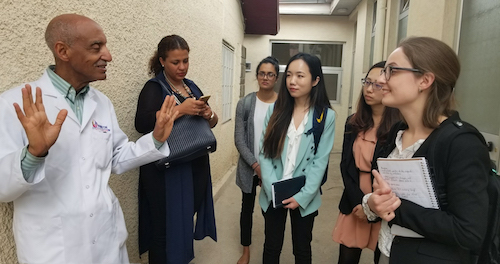
BA685 students working with Ethio-American Doctors Group (EADG) in Ethiopia interview a physician.
Qin Dong said the healthcare delivery course she took this semester taught her a lot about practices inside and outside the United States, including how healthcare organizations harnessed different business models to scale up and meet patient needs.But the biggest lesson for Dong from the weeks of classroom learning and in-country work came down to empathizing with the customer.
“My takeaway is probably true for every consulting-like project: don’t make assumptions about what is best for the customers, listen to them, and cater to their needs,” she said. “Any recommendations that don’t fit with a customer’s situation won’t be helpful at all regardless how successful it was in the past.”
Dong’s Rwanda team was one of five that spread out around the globe for the BA685: Healthcare Delivery in Emerging Markets course taught by WDI President Paul Clyde. Other teams worked in Ethiopia, India, Peru and Sri Lanka. All five teams will present recaps of their projects at 5 p.m. on April 16 in Room R1240 at the University of Michigan’s Ross School of Business. It is free and open to the public, and students in business, public health and other disciplines are encouraged to attend. A reception will follow.
Comprised mostly of MBA2 students, the course is designed to enhance participants’ international leadership capabilities, increase awareness of diverse business issues within the current global landscape, provide on-the-ground experience in a foreign country, and contribute to the success of partner health clinics and hospitals.
The course, organized and primarily funded by WDI with some financial support from Ross, responds to the increasing need for managers to have an international business perspective to augment their business and management knowledge. During the first part of the term, students learned about healthcare in emerging markets through lectures, guest speakers and case discussions. Students were then divided into five teams and prepared for visits to their selected country, traveling to those destinations in late February and early March.
The travel-study course empowers students to integrate what they learned in the classroom with hands-on experience. But unlike the Ross School Multidisciplinary Action Projects (MAP), Dong said the healthcare delivery course “exposes us to an environment where sponsors and other stakeholders have little business knowledge and no clear expectations about the projects.
“This can increase the difficulty and scope of the projects. However, it mimics real-life situations for the most part,” she said.
Clyde said the course is “business education at its best” – a collaborative learning environment with faculty and students learning from each other in an action-based learning setting.
“This course allows me to have detailed conversations with the students about some of the newer approaches to healthcare in low- and middle-income countries, and then gives them the chance to experience some of those markets in person and develop some of these new methods in concert with the institution,” Clyde said. “No matter how much I discuss it in class, there is no way to convey all of the challenges and opportunities in these markets without having the students actually visit the locations.”
Jennie Proto Gondhi, who was part of the Sri Lanka team, said she was attracted to the class to learn about the business perspective of healthcare and how business models can help solve public health problems. In pursuing a dual master’s in public health in epidemiology as well as health education/health behavior, Proto Gondhi said her classes dig deeply into evidence-based programs and validating data.
“However, I think sometimes a missing piece to public health problem solving is the idea that revenue, marketing and market value keeps programming going,” Proto Gondhi said.
She said the course showed her how valuable it is for people with public health and business skill sets to work in tandem to make a program successful.
“I enjoyed working and deliberating with teammates with varied expertise,” she said. “As we get ready to prepare our final reports and presentations, I walk away with the idea that public health programming can only be enhanced with further collaboration.”
Ross MBA student Kevin Jones, who worked with his team in Peru, called the course “probably the best interdisciplinary experience I’ve had at U-M.
“It integrates communities from the business, public health, policy and medical schools who have different but relevant perspectives on how to approach problems,” he said.
The Peru team worked with the Peruvian American Medical Society, a first-time partner for the course. The other institutions – Ethio-American Doctors Group (Ethiopia), LiveWell (India), Ruli District Hospital (Rwanda) and Grace Care Center (Sri Lanka) – have participated in the course multiple times, which allows Ross and WDI to build deep relationships and trust. Repeat partners also provides WDI with insights on what has and hasn’t worked with each institution, and that information is brought to bear in each project.
Here is a summary of each partner and project.
TEAM: Ethio-American Doctors Group (EADG)
LOCATION: Addis Ababa, Ethiopia
BACKGROUND: The Ethio-American Doctors Group is comprised of over 250 U.S. physicians of Ethiopian descent who have committed time and money to establish a state-of-the-art tertiary care hospital in Addis Ababa, Ethiopia.
PROJECT FOCUS: Develop a business model for a program to train nurses to international standards.
TEAM: Grace Care Center (GCC)
LOCATION: Trincomalee & Colombo, Sri Lanka
BACKGROUND: There is an extreme shortage of physicians in Sri Lanka and the number of people needing diabetes treatment is growing, making the shortage more acute. A GCC project looks into adding a new category of healthcare providers – diabetes technicians – to address the need.
PROJECT FOCUS: Assess the viability of a diabetic technician training program and undertake a market analysis to develop an understanding of the potential demand for such skills from existing physicians.
TEAM: LiveWell
LOCATION: Hyderabad, India
BACKGROUND: LiveWell Rehab Center in Madurai, India has been in operation since 2011. In October 2017, LiveWell began operations in Hyderabad.
PROJECT FOCUS: Examine the internal processes of the Hyderabad center compared to the Madurai facility to look for improvements.
TEAM: Peruvian American Medical Society (PAMS)
LOCATION: Chincha, Peru
BACKGROUND: PAMS Policlinico is a clinic offering multiple services, but is looking to become a center of excellence in ophthalmic surgery and gastroenterology.
PROJECT FOCUS: Conduct a market analysis to assess the profitability of a center of excellence in ophthalmic surgery and gastroenterology.
TEAM: Ruli District Hospital
LOCATION: Ruli, Rwanda
BACKGROUND: Ruli District Hospital, about two hours from Kigali, has worked with WDI for seven years and many of the projects are seeing fruit now.
PROJECT FOCUS: Study the revenue generating opportunities of a private clinic within the hospital.
WDI managed the Goldman Sachs 10,000 Women Entrepreneur Certificate Program in Rwanda, equipping 330 women entrepreneurs with the knowledge and skills needed to expand their enterprises. In cooperation with the School of Finance & Banking in Kigali, the program was offered 12 times from 2008 to 2015. During the six-month certificate program, participants created a detailed, actionable business plan. Sessions included: business planning, marketing, finance, accounting, and management. The program concluded with a business plan competition. Graduates were eligible for wraparound services and attended annual reunions.
Here are mini-documentaries featuring five of the program graduates.
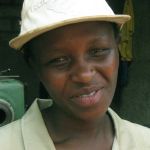
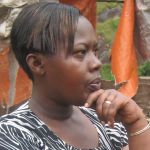
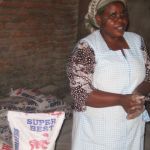
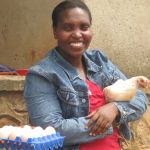
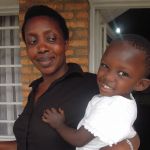
Our partnership with the Ruli District Hospital (RDH) and the Ihangane Project (TIP) is to improve healthcare service delivery and operations in Rwanda’s Gakenke District. The Ihangane Project is invested in the improvement of health in the Ruli area, through the provision of material, clinical, and technical assistance to the Ruli District Hospital Health System and Ruli community members. The project scope focused on patient tracking, in order of priority, patient tracking within the hospital, patient tracking between the health centers and the hospital, and patient tracking at the health centers, which did not currently track patients at all. The team provided recommendations on understanding staff capacities, patient-tracking process improvements and implementation.
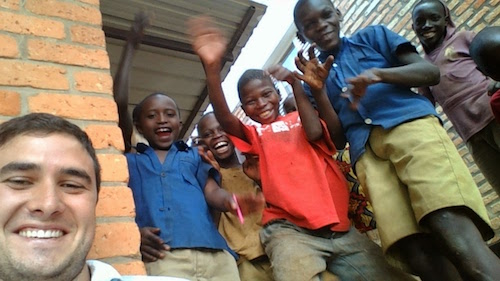
2015 WDI summer intern Julio Villasenor poses with some Rwandan children. This summer, WDI continues its long partnership with The Ihangane Project at Ruli District Hospital in Rwanda by sending summer intern Nana Asare there for a project.
Six University of Michigan students representing four schools and colleges will spend the summer abroad working as WDI Global Impact Fellows, tasked with formulating a strategic plan, streamlining supply chains, evaluating program impacts, empowering entrepreneurship, developing financial models, and creating a new business model.
The students represent the Ross School of Business, the Ford School of Public Policy, the School of Natural Resources and Environment (SNRE), and Health Informatics, a joint program of the School of Information and the School of Public Health. They will work in Ethiopia, Ghana, India, Kenya, Mexico, Rwanda, and Sri Lanka, and support the work of WDI initiatives in Healthcare, Performance Measurement, and Scaling Impact.
Five of the six summer internship projects were developed by WDI along with its partners. Two organizations – Grace Care Center and the Ihangane Project – are longtime partners with WDI and have sponsored student projects, both internships and Multidisciplinary Action Projects (MAPs), for several years. The work done by the summer interns at these organizations is building on previous projects performed by MAP teams, students in a travel-study course and previous interns all sponsored by WDI.
WDI also supports graduate students who source their own internship projects based on their educational, personal, and career interests provided that the work fall within one of the Institute’s research focus areas. One intern this year, Julia Entwistle, worked with the leadership at ADHENO, a non-profit focused on extreme poverty in Ethiopia, to define the scope of work for her project, then submitted a proposal to WDI for funding.
Entwistle has worked with WDI’s Performance Measurement Initiative (PMI) as she prepares to evaluate the impact of ADHENO’s environmental restoration and economic empowerment programs that operate in the Northern Shewa province of Ethiopia. PMI provided multiple rounds of feedback on the survey Entwistle has developed to conduct the impact assessment this summer.
“PMI hopes that the project will lead to new measurement-related learnings, especially related to environmental metrics and assessment,” said Heather Esper, senior program manager of the initiative. “PMI also is hopeful this work may lead to possible future collaborations with the organizations involved, including SNRE faculty.”
Here are the interns and their projects:
Nana Asare
Ruli, Rwanda
The Ihangane Project (TIP) empowers local communities to develop sustainable, effective, and patient-centered health care delivery systems that holistically respond to the needs of vulnerable populations. Partnering with Ruli District Hospital and its associated health centers, TIP is working to identify key strategies for improving health outcomes.
Since 2009, TIP has worked with WDI and the Ross School of Business to find ways to improve Ruli’s communication flow, cost-effectiveness, and financial sustainability. In winter 2016, Ross students worked with Ruli and TIP to develop a problem-solving framework designed to encourage hospital staff to proactively address challenges at the hospital. The students also created a curriculum and agenda for presenting this framework to staff members during a hospital retreat. That summer, a WDI summer intern helped Ruli and TIP successfully conduct the retreat.
Ruli has now turned its attention to formulating a strategic plan that reflects the priorities of the hospital and community, while also addressing the requirements of the Rwanda Ministry of Health. This past winter, Ross students created a framework for a hospital staff to use in developing a strategic plan during a retreat.
Asare will support the hospital staff to ensure a successful summer retreat. He also will help implement recommendations developed at the retreat, create a roadmap that can build upon the strategic plan developed at the retreat that will guide future projects, and evaluate the effectiveness of the retreat.
Karen Cuenca
Ford School of Public Policy
Mexico City, Mexico
Value for Women (VFW) is a UK-based social enterprise operating in Latin America, Africa, and Asia that works with partners to improve gender and social inclusion. Their specialists provide tailored technical assistance and capacity-building expertise to impact investors, banks, multinational companies, and NGOs, to deepen the inclusion dimension of their business models, value chains, programs, and products and services.
With supply chains in the agriculture sector increasingly under strain, the inclusion of women is critical, and smallholder farmer associations and small- and medium-sized enterprises (SMEs) have an opportunity to strengthen their role as suppliers to corporate entities.
Cuenca will conduct a situational analysis to understand and assess the current position of women in agriculture supply chains in Mexico, and recommend opportunities for improving gender inclusion in agriculture organizations and supply chains in Mexico.
Ann Duong
Becton, Dickinson and Company (BD)
Nairobi, Kenya and Addis Ababa, Ethiopia
Bangalore, India
Becton, Dickinson and Company (BD) is a global medical technology company working to improve medical discovery, diagnostics, and the delivery of care. BD actively engages with the U.S. President’s Emergency Plan for AIDS Relief (PEPFAR) to improve overall laboratory systems and services in African countries severely affected by HIV/AIDS and TB. This initiative is a public-private partnership with the U.S. Centers for Disease Control and the Ministries of Health in Ethiopia, Kenya, Mozambique, and Uganda.
Through both field-based and domestic work, Duong will be supporting implementation of the technical impact evaluation of the BD-PEPFAR program, Labs For Life: Strengthening Laboratory Systems in Developing Countries.
Following this project, Duong will travel to Bangalore, India for a short project with iSPIRT, a software product think tank that has been working with numerous start-ups in the development of IndiaStack. IndiaStack is an exciting set of technologies governments, businesses, and others utilize a digital infrastructure, creating a paperless and cashless service delivery model that is being integrated into India’s economy.
Duong will work with iSPIRT to connect and study various companies and start-ups that are utilizing IndiaStack’s APIs. After returning to Michigan, she will analyze this information in order to generate key insights into how stack technology can be used to enhance healthcare access and delivery.
Julia Entwistle
School of Natural Resources and Environment
Addis Ababa and Debre Berhan, Ethiopia
ADHENO implements various environmental restoration programs such as tree planting to slow the desertification process, soil protection measures such as terracing, and improving agricultural resilience through irrigation, water conservation, and crop diversification, to combat environmental degradation that negatively impacts agricultural productivity and revenue in Ethiopia. The organization also operates economic empowerment projects to support microenterprises such as beekeeping, animal rearing, basket weaving, and traditional spice processing to diversify the economy and include women in the workforce.
Entwistle will conduct an impact evaluation of ADHENO’s environmental restoration and economic empowerment programs that operate in the Northern Shewa province of Ethiopia. The organization wants a comprehensive evaluation of its work before rolling out the programs to more rural sub-districts in Ethiopia.
Danielle Wilkins
School of Natural Resources and Environment
Trincomalee, Sri Lanka
The Grace Care Center (GCC) is a home to about 70 orphaned children that offers daycare services and vocational training. It also is home to several poor and displaced seniors, many of whom have chronic health issues such as hypertension and diabetes.
Based on past work by MBA student teams from the Ross School of Business, GCC developed a diabetic care center model. Trained para professionals acquire data relevant to diabetes, which are sent to the University of Michigan to be tabulated and analyzed to segregate patients into risk categories. The medical data from 100 diabetes patients have been monitored and analyzed for the past five months.
A long-term, sustainable economic model needs to be developed and then subjected to a pilot test to ensure that the model has taken into account all the parameters. The end goal is a successful economic model that could be replicated in other parts of the country.
Wilkins will build upon the past work of her fellow U-M students to identify and develop a pricing strategy, build an economic model (subscription vs. government funded), and set up the pilot to test the chosen model.
Tim Yuan
Department of Mechanical Engineering, University of Michigan
Kumasi, Ghana
One of the applied projects in the Department of Mechanical Engineering’s lab is a solar e-trailer in collaboration with Pratt and Miller Engineering. The overarching goal is to demonstrate that transportation services enabled by affordable, low-speed, solar-powered electric vehicles (EVs) can improve the quality of life of the residents in the villages in Africa and the other developing countries. In 2016, a working prototype of a solar bicycle e-trailer was developed along with a preliminary business model.
Yuan will develop a market-entry strategy for the integrated transportation, electricity charging, and usage data collection services provided by solar bicycle e-Trailers (or similar small-sized solar EVs). He also will build a sustainable business model for manufacturing, distributing, and leasing such vehicles in villages and cities in Ghana.
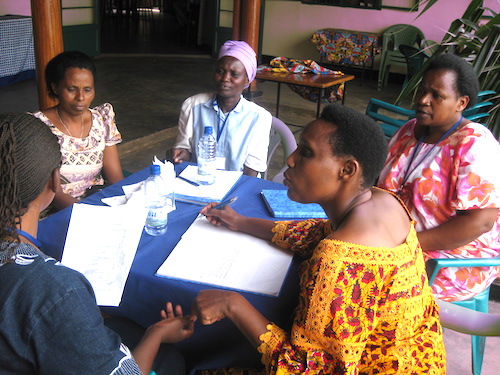
A WDI training session as part of the Goldman Sachs 10,000 Women initiative.
WDI’s Education Initiative is launching the Entrepreneurship Development Center for Emerging Markets (EDC), harnessing 15 years of experience helping entrepreneurs in emerging markets grow their ventures through education, training and consulting.
The new center will strengthen WDI’s long-established commitment to delivering top-notch entrepreneurship education and also highlight expanded offerings and services available to potential partners. The EDC also features a robust resource center of articles, blog posts, case studies, and learning tools.
Also making its debut along with the EDC is the Education Initiative’s proprietary 6M Entrepreneurship Development Model which outlines the six “M’s” — mindset, markets, money, mechanisms, management, mentorship — that WDI uses to design and deliver entrepreneurship education. WDI combines the latest, best practices with innovative pedagogy and learning tools, and then works with regional experts in emerging markets to localize content. The result is a program that is globally applicable and culturally relevant to the partner.
Amy Gillett, vice president of the Education Initiative, said the EDC’s launch is very timely.
“Emerging market countries around the globe are looking for ways to grow and diversify their economies,” she said. “Many of these countries also suffer from high unemployment. We believe entrepreneurship is an effective solution. However, to succeed, entrepreneurs need the proper training, support, and resources and the countries need to create effective ecosystems. The EDC is set up to support these needs.”
For the past 15 years, WDI’s Education Initiative has delivered entrepreneurship training programs in Africa, the Middle East, Southeast Asia, Central and Eastern Europe, and Latin America to owners and managers of small- and medium-sized enterprises.
For example, WDI trained more than 100 entrepreneurs from throughout Morocco under a grant from the U.S. State Department. As part of the Goldman Sachs 10,000 Women initiative, WDI successfully trained 330 women entrepreneurs in Rwanda.
And WDI demonstrated its thought leadership on entrepreneurship education when it convened academics and practitioners at the University of Michigan for the 2011 “Global Summit on Educating Entrepreneurs,” a global conference on how to plan, deliver, and assess world-class entrepreneurship training programs in emerging markets.
Learn more about the Education Initiative in the video below.
Gillett said the Education Initiative’s long history of aiding entrepreneurs makes WDI uniquely qualified to offer successful and rewarding entrepreneurship programs.
“After successfully training hundreds of entrepreneurs and entrepreneurship instructors over the past two decades, we are well-positioned to serve this role,” Gillett said. “We are excited to launch the Entrepreneurship Development Center and expand our entrepreneurship development efforts.”
Amy Gillett discusses development through entrepreneurship in an interview on enterprises’ role in alleviating poverty in the newsletter of Education partner Pontis Foundation.